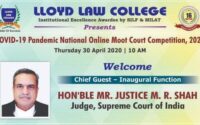June 15, 2021
In Conversation with the Winners of 12th Leiden Sarin International Air Law Moot, 2021
Details of the Competition: 12th Leiden Sarin International Air Law Moot, 2021
Name of the Team Members: Anushka, Ayesha Zaidi and Shashwat Awasthi
Name of the College: Dr. Ram Manohar Lohiya National Law University, Lucknow
Awards: Winner and Best Oral Arguments – Respondent
Questions:
- What made you choose this moot in the first place?
Our team was very much determined to take up a moot which involves Public International Law and Leiden has always been considered one of the primary moots for PIL. We read quite a few moot problems and Leiden’s case matrix interested us the most. Leiden’s moot proposition offered us the most challenging yet very practical aspect of Air Law. In the meanwhile, we were so intrigued by the nuances Air Law that all three of us took up courses to learn about the subject matter in detail. Thereon, we were fully in love with the subject matter and the problem; and there was no turning back. Moreover, the timeline of the moot suited us perfectly. Lastly, the reputation of the moot alongside the brilliant organizations that are associated with it, attracted us a lot. - What was the process of preparation? How did you go about it?
This year the qualification rounds for Leiden were multi-fold and very rigorous. We decided to take a stepwise approach for this moot. Initially we only ensured that our research was watertight, for which all three of us researched upon every issue of the problem. We made sure that we sat every night to discuss whatever we had read and clear our doubts, if any. Since the first selection criteria was on the basis of memorials and pre-recorded video, we concentrated our efforts towards drafting a quality memorial and recording a quality video in a professional set up. After winning the National Rounds, we were unanimously advised by people who had done this moot before, to start afresh for the World Rounds. Since our research was strong, we did not find any new arguments for the International Rounds. Therefore, our priority had shifted towards ensuring finesse in the speaking style and time management. We gave several mocks and tried to include all the feedbacks and suggestions.
- How important is the essence of team effort during moot preparations? How was it like working with your team? Did you have any conflicts? How did you resolve them?
In our opinion, without teamwork and sufficient coordination, one cannot win a moot. Success in any team related activity requires the building of necessary support structures for each other. It’s very important to understand the problems that your team mates are facing and act with empathy. This is very important for the trust building process as well. The three of us can say without any doubt that this is the best team that we could have had for this moot. Conflicts are a part and parcel of the process, but what is important is the resolution of those conflicts and moving forward with the same amount of trust. - How many teams were you up against in this competition? Which team would you consider to be the toughest competition?
A total of 42 teams across the World participated in the 12th edition of the Leiden International Air Law Moot. 4 teams were selected out of 20+ teams from India for the National Rounds, out of which only 3 qualified to represent India in the World Rounds. There were 16 teams from all over the world which participated in the International Rounds. All the teams we were up against at the International level had top notch preparation and so we had to be at our best at all times. However, the team from Chinese University of Hong Kong in the finals had an excellent presentation in terms of arguments. - How was the final round and who were you up against? How would you describe the opposing team? What were the techniques to crack it up?
The final round was a really close call between us and the Chinese University of Hong Kong. Although the finals were extremely competitive, yet we believed that we had put in our best efforts and had a good shot at it. The opposite team was well prepared and had an excellent manner of oral presentation. All we focused on for the finals was to convey our arguments to the judges in simplistic terms and finish our speech on time. We also made sure that we addressed every question posed by the bench and answered them very calmly. The key was to get across all the arguments in a very crisp yet simple manner and not panic at any point of time. - Students mostly are too scared and hesitating while participating in moot court due to intense research work. How important is mooting in a law student’s career. Any message would you like to pass on to the law students?
Intense research work is required in every phase of a law student’s life, if one wants to succeed. Legal research forms a very integral part in the law profession and is indispensable for one’s career. Mooting is just a medium to enhance these research skills and requires dedication and consistency. We feel that mooting is a quintessential activity to gain knowledge about a subject matter of interest, which perhaps is not included in the course curriculum. It does not only develop legal research and drafting skills, but also hones one’s skills with respect to time management and teamwork. After Leiden we had quite a few takeaways from the win: firstly, it is very important to pick up a moot whose subject matter interests you since any moot is a long time commitment. Secondly, a good team will always motivate you to work harder and help you in cases of difficulties. Lastly, always enjoy the process of mooting and do not take it as a burden. - Final comments on the level of competition and the organization of the competition.
This year Leiden had narrowed down its selection process, raising the difficulty bar a notch higher, especially for teams like India which had to qualify for the National Rounds as well. Even though, the moot was in an online set-up, the procedure was extremely smooth and non-complicated. We wish we could have interacted with the judges in person; however, the virtual rounds were organized seamlessly, and the organizers deserve huge credit for that.


